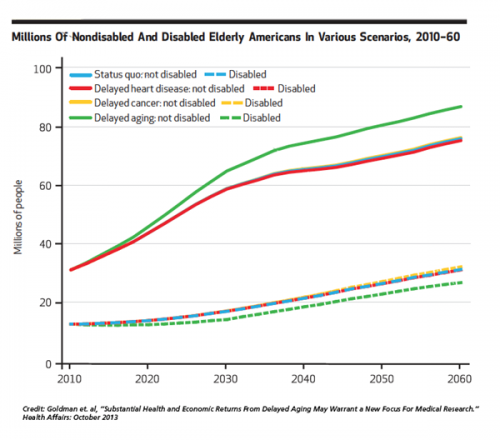Delayed aging is better investment than cancer, heart disease

On the heels of an announcement from Google that the company's next startup, Calico, will tackle the science of aging, a new study shows that research to delay aging and the infirmities of old age would have better population health and economic returns than advances in individual fatal diseases such as cancer or heart disease.
With even modest gains in our scientific understanding of how to slow the aging process, an additional 5 percent of adults over the age of 65 would be healthy rather than disabled every year from 2030 to 2060, reveals the forthcoming study in the October issue of Health Affairs.
Put another way, an investment in delayed aging would mean 11.7 million more healthy adults over the age of 65 in 2060. The analysis, from top scientists at USC, Harvard, Columbia, the University of Illinois at Chicago and other institutions, assumes research investment leading to a 1.25 percent reduction in the likelihood of age-related diseases. In contrast to treatments for fatal diseases, slowing aging would have no health returns initially, but would have significant benefits over the long term.
In the United States, the number of people aged 65 and over is expected to more than double in the next 50 years, from 43 million in 2010 to 106 million in 2060. About 28 percent of the current population over 65 is disabled.
"In the last half-century, major life expectancy gains were driven by finding ways to reduce mortality from fatal diseases," said lead author Dana Goldman, Leonard D. Schaeffer Director's Chair at the USC Schaeffer Center for Health Policy and Economics. "But now disabled life expectancy is rising faster than total life expectancy, leaving the number of years that one can expect to live in good health unchanged or diminished. If we can age more slowly, we can delay the onset and progression of many disabling diseases simultaneously."
The study shows significantly lower and declining returns for continuing the current research "disease model," which seeks to treat fatal diseases independently, rather than tackling the shared, underlying cause of frailty and disability: aging itself.
Lowering the incidence of cancer by 25 percent in the next few decades – in line with the most favorable historical trends – would barely improve population health over not doing anything at all, the analysis showed. The same is true of heart disease, the leading cause of death worldwide: About the same number of older adults would be alive but disabled in 2060 whether we do nothing or continue to combat cancer and heart disease individually. The findings are in line with earlier research showing that curing cancer completely would only increase life expectancy by about three years.
"Even a marginal success in slowing aging is going to have a huge impact on health and quality of life. This is a fundamentally new approach to public health that would attack the underlying risk factors for all fatal and disabling diseases," said corresponding author S. Jay Olshansky of the School of Public Health at the University of Illinois-Chicago. "We need to begin the research now. We don't know which mechanisms are going to work to actually delay aging, and there are probably a variety of ways this could be accomplished, but we need to decide now that this is worth pursuing."
Several lines of scientific inquiry have already shown how we might age more slowly, including studies of the genetics of "centenarians" and other long-lived people. Slowing the signs of biological aging has also been achieved in animal models, using pharmaceuticals or interventions such as caloric restriction.
But until now, no assessment has been made of the costs and health returns on developing therapies for delayed aging: "We would be affecting every generation. This study is a benchmark in the world of public health," Olshansky said.
The study shows that, with major advances in cancer treatment or heart disease, a 51-year-old can expect to live about one more year. A modest improvement in delaying aging would double this to two additional years—and those years are much more likely to be spent in good health.
The increase in healthy years of life would have an economic benefit of approximately $7.1 trillion over the next five decades, the researchers find. Their analysis did not account for the potential cognitive benefits for older adults with research in delayed aging.
However, the results of the study also show that improving the population of healthy, older adults will not lower overall health care spending. With research advances in delayed aging, more people would be alive past the age of 65, which means significantly higher outlays for Medicare and Medicaid despite less per-person spending on medical costs.
"Shifting the focus of medical investment to delayed aging instead of targeting diseases individually would lead to significant gains in physical health and social engagement," Goldman said. "We see extremely large population health benefits, and the benefits will extend to future generations. There are major fiscal challenges, but these are manageable with reasonable policy changes, and the economic value of such a shift is too large to ignore."















